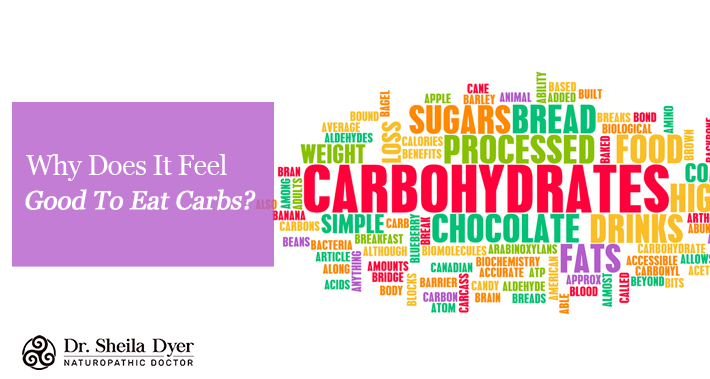
Most people have foods they consider their “comfort foods”.
These foods often have sentimental or nostalgic value tied into them.
They bring back fond memories of childhood, a time when someone else was responsible for looking out for your wellbeing.
It might be freshly baked bread, just like grandma used to make, or a favourite cookie recipe.
Maybe it’s a plate piled high with spaghetti, or a warm, cheesy slice of pizza.
What do most comfort foods have in common?
They’re high in carbohydrates.
And that’s no coincidence.
Working as a naturopathic doctor online as well as in person, I often hear concern about carbs from my patients.
But I’m here to tell you that you shouldn’t be afraid of this important macronutrient.
We’ve looked at carbs before, in one of my older articles – Smart Bedtime Snacks To Keep You Asleep.
Today, we’re going to look at the benefits of carbs, why your body craves them, and how to distinguish healthy carbs from the less desirable ones.
Keep reading to find out more.
First Of All, What Are Carbs In Simple Terms?
Carbohydrates are one of the three major macronutrients –the other two being fats and proteins.
When you eat carbs, your body breaks them down into glucose.
This gives you energy to fuel your tissues, cells, and organs.
Broadly speaking, carbohydrates can be broken down into two categories: simple and complex.
Your body digests simple carbs quickly.
This can lead to spikes in blood sugar.
Complex carbs are harder to digest because they tend to be higher in dietary fibre.
This results in a slower release of glucose and prevents spikes in blood sugar.
What Are The Benefits Of Carbohydrates?
Even though carbs have been demonized by the various fad diets out there, there are a lot of reasons your body needs them.
Let’s look at the benefits of this important nutrient.
1. Your Body Uses Them For Energy
As mentioned previously, your body breaks down carbohydrates into glucose.
Glucose is used by your body’s cells to produce a molecule called adenosine triphosphate (ATP).
ATP is used by your body for everything from synthesizing protein to muscle contractions.
Even though your body can produce ATP from a variety of sources, carbohydrates are the preferred source for this.
2. Your Body Stores Them For Energy Later
Part of the reason we don’t need to be constantly eating to maintain energy is because our bodies are able to store some for use at a later time.
If your body doesn’t need to use the energy from glucose right away, it converts it to glycogen, which is stored by the liver and muscles to be used later.
When your body needs to access that glycogen, the hormone glucagon converts it back to glucose so it can be used for energy.
RELATED: Hormonal Imbalance Naturopathic Doctor In Toronto
3. They Can Affect Your Heart Health
Complex carbohydrates contain fibre which is full of heart benefits.
Fibre has been shown to help lower LDL or “bad” cholesterol levels.
Fibre intake has also been correlated with a lower risk of heart disease.
So a naturopathic approach to heart disease may include increasing your dietary fibre, which means eating more complex carbs.
4. They Keep Your Digestive System Healthy
We just talked about the benefits of fibre for heart health, but of course, it’s also beneficial for digestion.
As soluble fibre passes through your digestive tract, it attracts water and creates a thick, gel like substance which helps improve your bowel movements.
Soluble fibre can be found in foods such as legumes and oats.
Insoluble fibre can help relieve constipation and speeds up the process of things moving through your digestive tract, plus it can guard against diseases affecting the digestive tract.
It can be found in fruit and vegetables, as well as in the complex carbs found in whole grains.
RELATED: Naturopathic Digestive Health Clinic In Toronto
Why Does Eating Carbs Make You Feel Good?
So we’ve discussed the reasons carbs are good for you, but this doesn’t explain why they make us feel so good.
When you eat carbohydrates, it leads to a spike in insulin levels which results in the production of serotonin.
Serotonin is a neurotransmitter which plays a large role in mood, and happiness in particular.
What Are The Healthiest Carbs?
Not all carbs are created equal.
Complex carbohydrates are the ones which contain things like fibre which means you digest them more slowly.
Some sources of “good” or complex carbohydrates include:
- Nuts
- Seeds
- Legumes, including beans, peas, and lentils
- Quinoa, oats, and other whole grains
- Brown Rice
- Whole grain pasta
- Whole grain cereals
What Are Bad Carbs To Avoid?
Simple carbs are often also the tastiest.
They can cause spikes in blood sugar, and don’t leave you feeling full and satisfied.
These include:
- Pastries
- White rice
- Refined pasta
- White bread
I’m not saying you can’t enjoy the occasional pastry, or celebrate a birthday with a slice of cake.
But in general, these types of carbs should be eaten in moderation.
Book Your Appointment With Dr. Sheila Dyer, ND, Today
Are you looking for ways to improve your health through better nutrition?
Does constant marketing from food companies confuse you?
Would you like someone to help you navigate all this?
I’m Dr. Sheila Dyer, ND and I can help.
As a naturopathic doctor working in Toronto, I’ve helped clients take hold of their nutrition, better understand why certain foods make them feel unwell and improve their health by changing their diets.
Book your appointment with Dr. Sheila Dyer, ND, today.
If you have questions about naturopathic medicine, or would like to start with your first consultation, contact me, and let’s book an appointment.
Dr. Sheila Dyer, ND1080 Dovercourt Rd,
Toronto, ON M6H 2X8
(416) 554-5135
► https://g.page/DrSheilaDyerNd
Dr. Sheila Dyer is a Naturopathic Doctor and a practicing registered nurse offering holistic healthcare with a scientific focus